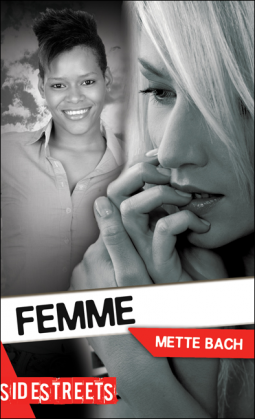Femme is a nice little YA coming-out novel. It’s told by Sofie, who eventually identifies as a femme (I’m not giving anything away by saying this, seriously), and involves Clea, who fits, as Sofie’s boyfriend Paul says, “the classic jock lesbo stereotype.”
Femme is safe to add to school collections (the publisher recommends it for ages 13-18) and is definitely a good public library addition. It is not a book you’ll remember on your deathbed, but it has some excellent qualities. Let’s point them up right now: This is a high-interest, low-level novel (it’s written on a third-grade level). It’s short. You can give it to a reluctant reader and know that reader has a good chance of finishing it. It has a passable cover immediately identifiable as part of Lorimer’s “edgy” issues-laden SideStreets series (U.S. readers, think Orca’s high interest-low level books).
Femme also features a strong, positive, mixed-race love interest (Clea’s mom is white, and her dad is black–they’re still together, by the way, and successful, and very supportive of their daughter), and, eventually, a happy, healthy, interracial same-sex relationship. This is worth emphasizing in a YA lit world where “interracial relationship” is often a signifier for “tragic/bittersweet ending.”
Sofie is a senior, dating the BMOC. She’s not in honors classes, and she’s not headed for a prestigious (Canadian–Femme takes place in Canada) university. No one has ever believed in her before. Sofie assists her (single) mom with the family business, Sunny Side Cleaning. Sofie loves to cook, and she’s been part of her school’s interfaith group and knitting club. Until Paul, anyway. Now Paul takes up most of her time.
And now her English teacher has paired her for the year with Clea. Clea’s brilliant, and athletically talented and also, she’s the school’s only out lesbian.
Paul is a stereotypically oafish senior pretty boy. It’s not that he’s mean; he just doesn’t think. The others in his crowd are broadly drawn too. His mean ex is complemented by other mean girls; he wants more than Sofie is comfortable giving; he derides her interests. And Sofie’s a little confused. Why does he think their making out sessions are so intense? She’s not all that engaged.
SPOILERS: (Really, are these spoilers? Do we seriously not know what’s going to happen?) The storyline is predictable, which is not at all a criticism. It includes a growing awareness, a breakup with the boyfriend, a shy beginning with the girlfriend, the inevitable backlash at school, dealing with Mom, and finally–a sweet resolution with the tang of new hope. END SPOILERS!
This is a fine title to hand to a young person who doesn’t think they like reading, but who might be looking for a book like this to identify with. Or who just wants a nice short romance. My one caveat is that Sofie is very naive and might not appeal as a narrator to more worldly kids. On the whole, this is a sweet little story (with some requisite homophobic ugliness that gets resolved).

